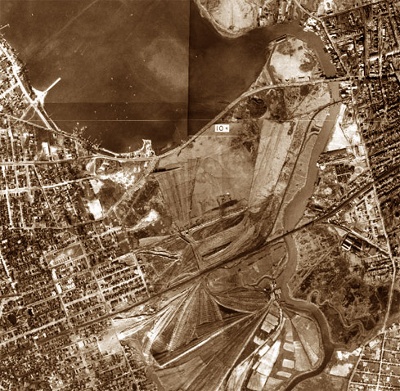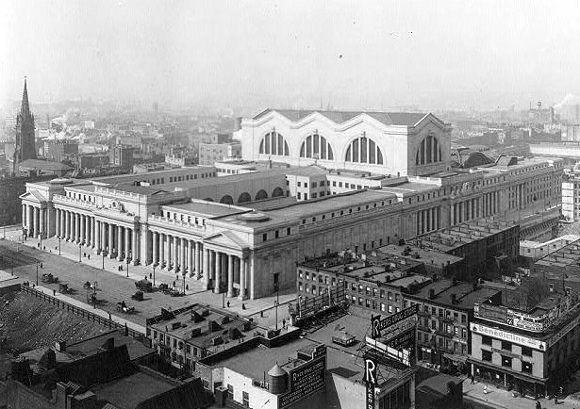The Great Gatsby Contents
Chapter 2
Synopsis of Chapter 2
This chapter opens with a description of the ‘valley of ashes’, between West Egg and New York, and an advertisement which features the eyes of Doctor T. J. Eckleburg. Nick then narrates a meeting with Tom’s mistress, who lives with her husband George Wilson, at a garage in that ‘waste land’.
Nick, Tom and Mrs Wilson travel into New York and to an apartment, where guests are invited and everyone gets drunk. Mrs Wilson, now identified as Myrtle, spends Tom’s money on numerous luxury items, including a puppy, clothing, perfume and magazines, and makes highly critical comments about her husband. Tom’s deceitfulness is compounded by the information which Myrtle’s sister offers Nick. She asserts that Tom’s wife refuses to divorce him because she is Catholic, and that this is the barrier to Tom marrying Myrtle. The ‘elaborateness’ of Tom’s lie shocks Nick, given that he knows his cousin is not a Catholic.
As the party becomes increasingly drunk, Tom breaks Myrtle’s nose in response to her saying Daisy’s name. Nick leaves the party at this point, following one of the guests, Mr McKee. He seems to spend some brief time in Mr McKee’s home and then finds himself half-asleep at the railway station at four o’clock in the morning.
Commentary on Chapter 2
 valley of ashes - This location is crucial to the novel as a symbol of cultural and spiritual bankruptcy, which commuters from West Egg must experience in their daily journey to New York. We are told that the motor road tries to ‘shrink away’ from this place, using personification to suggest the responses of the drivers themselves. Even on the train, ‘the passengers can stare at the dismal scene for as long as half an hour’ or must ‘halt there … at least a minute’ – forcing some contemplation of its existence. The connotations of ‘ashes’ (death, fire, sterility and, in religious terms, the mortality of flesh and the folly of materialism) are heavily underlined in this passage. The fusion of mythical and realist elements in the description of this valley is reminiscent of T S Eliot’s poem The Waste Land, which concerns itself with spiritual decay.
valley of ashes - This location is crucial to the novel as a symbol of cultural and spiritual bankruptcy, which commuters from West Egg must experience in their daily journey to New York. We are told that the motor road tries to ‘shrink away’ from this place, using personification to suggest the responses of the drivers themselves. Even on the train, ‘the passengers can stare at the dismal scene for as long as half an hour’ or must ‘halt there … at least a minute’ – forcing some contemplation of its existence. The connotations of ‘ashes’ (death, fire, sterility and, in religious terms, the mortality of flesh and the folly of materialism) are heavily underlined in this passage. The fusion of mythical and realist elements in the description of this valley is reminiscent of T S Eliot’s poem The Waste Land, which concerns itself with spiritual decay.
Fitzgerald uses nightmarish and hellish imagery to describe this location, inverting the usual agricultural landscapes associated with American prosperity. The valley is a ‘fantastic farm’ where normal objects (wheat, hills, gardens, houses, chimneys, men) are made of ashes, but are ‘grotesque’, alive, growing and moving about.
fantastic – associated with fantasy, rather than the more modern positive meaning. This word has undergone semantic change since the writing of the novel.
A line of grey cars… comes to rest - There is a sense of work being done in this location, but the language emphasises the proximity to death as the line of cars (reminiscent of a funeral procession) ‘gives out a ghastly creak, and comes to rest’.
ash-grey men - This suggests that the inhabitants are between life and death, reinforced by their moving ‘dimly and already crumbling through the powdery air’. (See Earth, clay, dust.)In terms of the American Dream, and the goal of economic wealth, these figures are excluded and faceless. The phrase ‘dumping ground’ reinforces the idea of these men being the detritus of American society.
swarm up with leaden spades and stir up an impenetrable cloud, which screens their obscure operations from your sight - This is an even more disturbing image, as the workers’ activity is hidden and menacing. The mention of spades reinforces the funerary image created by the line of cars.
The eyes of Doctor T. J. Eckleburg - This feature is located ‘above the grey land’ and is actually a giant advertising hoarding, indicating the dominance of commercialism in American culture. The decay of this hoarding, as it has been abandoned and then ‘dimmed a little by many paintless days, under sun and rain’ further develops the sense in which commercial enterprise has had a negative and lasting impact. The connotations of the eyes as they ‘brood on over the solemn dumping ground’ suggest that there is a higher level of awareness, even a deity, with a greater perspective than that of mere human underneath the ‘gigantic’ billboard.
Nick refers to the billboard as if it is real, with a ‘persistent stare’. Ironically, Wilson misinterprets the eyes as being the eyes of God, in Chapter 8, in an attempt to assert the importance of private moral values over the public appearance of virtue. (‘You may fool me, but you can’t fool God!’). This is a futile claim precisely because the omniscient ‘God’ here is artificial and only a symbol of commercialism.
small foul river - This detail is reminiscent of Hades and the River Styx, especially with the reference to ‘barges’ passing through.
Myrtle / Wilson - Having set the scene in this chapter, Fitzgerald then introduces two important characters, Tom’s mistress (Myrtle) and her husband (George Wilson, known as Wilson).
The interior was unprosperous and bare - The location is again important in identifying the Wilsons’ social status and role in the novel.
the dust-covered wreck of a Ford which crouched in a dim corner - Cars are symbolic throughout The Great Gatsby, as objects associated with technological progress and consumerism in America. The image of the wrecked car is a particularly powerful sign of progress leading to disaster. Personification suggests oppression and the threat of violence within Wilson’s garage. The dust covering the car is a reminder that the valley of ashes affects everything which resides there.
George Wilson is described as:
in whom the sense of hopelessness is highlighted by the ‘damp gleam of hope’ in his eyes. The relationship between Tom and Wilson is uneasy, partly achieved by the use of the adverbs ‘jovially’, ‘unconvincingly’ and ‘coldly’ but also because the reader is keenly aware that Tom is having an affair with Wilson’s wife. George is described as:
Myrtle Wilson is described in equally unpleasant language:
She is emphatically not depicted as beautiful, having ‘no facet or gleam of beauty’ but a:
Myrtle is associated with desire and restlessness, and the remainder of the chapter reveals that, while she is an object of physical gratification for Tom, her true desires are for material objects. Myrtle’s purchases are related by Nick: two society magazines, cold cream, perfume, a puppy and then items for the puppy. She later decides to ‘make a list of all the things I’ve got to get’. We are told that the dust of the valley does not settle on Myrtle as she ‘moved closer to Tom’, so in her aspiration to gain wealth and status she escapes the dust, albeit temporarily. Myrtle transforms herself still further as she changes her dress and exudes an ‘impressive hauteur’. However, Myrtle’s attempts to reinvent herself are presented as artificial, and she suffers humiliation and pain at the hands of Tom.
company commenced to arrive - Nick, Tom and Myrtle go to Tom’s apartment in New York, and more guests are invited for a small-scale party (compared to the grand and excessive parties at Gatsby’s house). Myrtle’s sister, Catherine, and the McKees appear, and Nick joins Tom in drinking whisky. The effects of the alcohol are conveyed by the narrative style from this point: it becomes tentative and confused (‘it didn’t make any sense to me’) with time passing unnoticed:
The mood is increasingly unpleasant as Nick perceives Myrtle as:
and the repetition of the words ‘shrill’ and ‘shout’.
Nick witnesses more of Tom’s dishonesty – his ruse about Daisy’s Catholicism. The subsequent discussion of marriage between Mrs McKee and Myrtle proceeds on the assumption that marriage is inevitable and that women are acquired by men.
The tension of the party leads eventually to violent action by Tom in response to Myrtle saying Daisy’s name and defying him:
Nick reports this with Tom’s full name, and a matter-of-fact tone, as if making a legal statement. Tom’s easy violence is further evidence of his character and also functions as a foreshadowing of Myrtle’s death, which directly results from her competition with Daisy for Tom’s affection. Nick’s subsequent departure from the party (with Mr McKee) suggests that the men are escaping female hysteria and confusion.
an over-enlarged photograph - Nick makes several comments about the photographs and images in the apartment, which serves to highlight their illusory or misleading nature. His misinterpretations are sometimes comic:
- the hen resolved itself into a bonnet, and the countenance of a stout old lady beamed down into the room
- the dim enlargement of Mrs Wilson’s mother which hovered like an ectoplasm on the wall.
In other instances, Mrs McKee’s encouragement of her husband to ‘make something’ of various women’s images seems to be verging on the voyeuristic.
 Mr McKee - Nick’s departure from the party with Mr McKee around midnight and subsequent visit to Mr McKee’s apartment is related in a discontinuous chronology, reflecting the advanced stage of drunkenness that Nick has reached. The passage ends with him finding himself ‘lying half-asleep in the cold lower level of the Pennsylvania Station’ around four o’clock in the morning. The intervening hours are represented in two short scenes, in the elevator and in Mr McKee’s bedroom. Both of these scenes could be read as having homoerotic undertones.
Mr McKee - Nick’s departure from the party with Mr McKee around midnight and subsequent visit to Mr McKee’s apartment is related in a discontinuous chronology, reflecting the advanced stage of drunkenness that Nick has reached. The passage ends with him finding himself ‘lying half-asleep in the cold lower level of the Pennsylvania Station’ around four o’clock in the morning. The intervening hours are represented in two short scenes, in the elevator and in Mr McKee’s bedroom. Both of these scenes could be read as having homoerotic undertones.
Mr McKee has earlier been described as a ‘pale, feminine man’ and Nick notes that he was compelled to wipe his face, because a ‘spot of dried lather’ had ‘worried me all afternoon.’ This is one of the few tender moments associated with Nick, along with his kiss with Jordan at the end of Chapter 4.
Investigating Chapter 2
- List the different aspects of Chapter 2 which are concerned with religion.
- What are the differences between the party at Tom’s flat and the other parties in the novel?
- Nick observes several betrayals in this chapter – which do you find the most shocking and why?
- ‘I knew he was below me….But if I hadn’t met Chester, he’d of got me sure.’ How does Mrs McKee’s comment reflect on the marriage of Daisy and Tom?
- Fitzgerald is here depicting the poorer members of American society – why do you think he chooses to give Wilson the occupation of repairing cars?
- List all the occupations of characters in the novel and consider their significance.
- What ideas about American society are conveyed by these details?
Recently Viewed
Related material
Scan and go

Scan on your mobile for direct link.